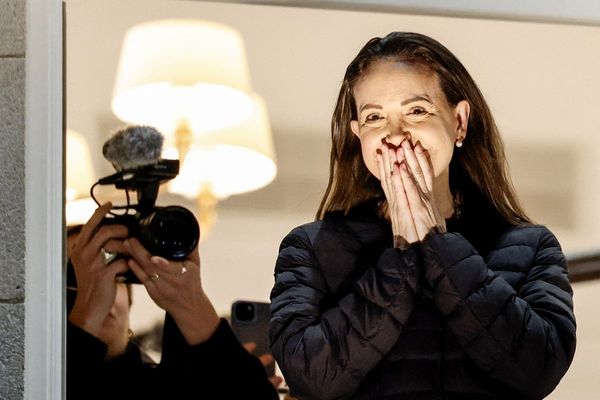
Labor’s foreign affairs spokesperson, Penny Wong, says it may be possible for Australia to achieve a diplomatic thaw with China despite the substantial differences between the two countries – if Scott Morrison abandons his “desperate” pre-election weaponisation of national security.
The foreign affairs minister, Marise Payne, this week met China’s new ambassador to Australia, who has made several overtures for dialogue since arriving in Canberra in January.
Subsequently, the shadow minister told the Guardian’s Australian Politics podcast that diplomatic engagement was important. But she said whether the relationship ultimately became more productive was “a question for China”.
“We can’t control how they behave,” Wong said. “If China chooses to continue to impose what are clearly coercive economic measures on Australia, then that’s going to have a consequence in terms of the relationship.”
Wong said if Labor won the federal election in May, Australia would not be taking “a backward step” on any substantive points of disagreement with Beijing.
“We won’t be abandoning the positions that cause China concern – Australia’s position on the South China Sea, Australia’s right to determine who builds its 5G network and who is part of the NBN,” Wong said. “We’re not going to abandon our position on the UN convention on the law of the sea or human rights or foreign interference.”
But she added: “What we wouldn’t do is play domestic politics with the China relationship.”
“I’ve not seen [a prime minister] use terms like Manchurian candidate, or Beijing’s preferred candidate, ever,” Wong said.
“It is it is a demonstration of the extent to which Scott Morrison is desperate, but it is also a trashing of Australia’s national interests because one of the things that makes us strongest is our unity.”
Wong said the relationship with Australia’s largest trading partner was “complex and challenging and difficult” and is “only made harder, by the playing of domestic politics with that”.
Payne met China’s new ambassador, Xiao Qian, in Sydney on Wednesday. It is understood there was no diplomatic breakthrough in the meeting.
Although it is standard for the minister to meet with a newly arrived ambassador, it is believed to be the highest level contact between the two countries since Payne spoke with China’s foreign minister, Wang Yi, two years ago.
A spokesperson for Payne said Australia was “committed to a constructive relationship with China in which we can pursue areas of cooperation, while remaining consistent with our own national sovereign interests and focused on stability”.
“The minister for foreign affairs set out frankly Australia’s positions on a range of issues, including the importance of appropriate ministerial and other high level dialogue and engagement, stability in the Indo-Pacific, free and open trade, human rights and the welfare of Australians detained in China,” the spokesperson said.
“She also articulated Australia’s expectation that China use its influence to encourage and advise Russia to end the illegal invasion of Ukraine.”
Xiao, who was previously China’s ambassador to Indonesia, said last month that China was “willing to work with Australia to meet each other halfway”.
He said the two governments should “jointly make efforts” to push the relationship back on “the right track”. While Xiao did not specify any tangible actions Beijing may take, he said: “The diplomatic channel is open.”
Australian ministers have complained since early 2020 they have been unable to secure phone calls or meetings with their direct counterparts in China – although contact has continued to occur at lower diplomatic levels.
The Australian government accused Beijing of engaging in “economic coercion” by hitting a range of Australian export sectors with tariffs, bans or other sanctions in 2020 – some of which are being challenged at the World Trade Organization.
China accuses Australia of being increasingly hostile to Chinese investment, including through the ban on Chinese telco Huawei’s involvement in the 5G network.
Both major political parties in Australia view the differences in the relationship as largely structural and therefore not something that can be fixed by adopting a different tone.
China is particularly sensitive to criticism about human rights abuses in Xinjiang, the crackdown on dissent in Hong Kong and Australia’s longstanding position against using force or the threat of force to bring Taiwan under Beijing’s control. Beijing has also ramped up its criticism of new or renewed groupings such as the Quad and Aukus.
Still, Xiao’s comments signalled a more open approach to dialogue, and contrasted with a warning from his predecessor, Cheng Jingye, in April last year that Beijing would respond “in kind” if Australia followed other countries in imposing sanctions against its officials over human rights abuses against Uyghurs in Xinjiang.
China’s diplomatic tactics have previously backfired. The embassy was rebuked by both sides of Australian politics in late 2020, after the release of a list of 14 areas of disagreement with Australia. The one-page document did not have a title but became known as a “list of grievances”, and it was reported that China was seeking concessions on those points in order to resume dialogue.
The list included “outrageous condemnation of the governing party of China by MPs” and “unfriendly or antagonistic” reporting on China by Australian media outlets.
Morrison showed the list to his international counterparts to make the case that Beijing was demanding policy changes that no liberal democratic government could accept.
Tensions flared again last month after Morrison accused China of a dangerous “act of intimidation” over a Chinese warship’s shining of a laser at a RAAF surveillance plane north of Australia. China’s national defence ministry, in turn, accused the Australian defence force of “spiteful and provocative actions”.
The defence minister, Peter Dutton, said on Thursday it would be wrong to assume President Xi Jinping’s ambitions were “restricted just to Taiwan”, as the Australian government announced plans for a major expansion of the Australian defence force over the coming two decades.
China’s embassy was contacted for comment on the meeting with Payne.
The full interview with Penny Wong will be available on the Australian Politics podcast on Saturday







